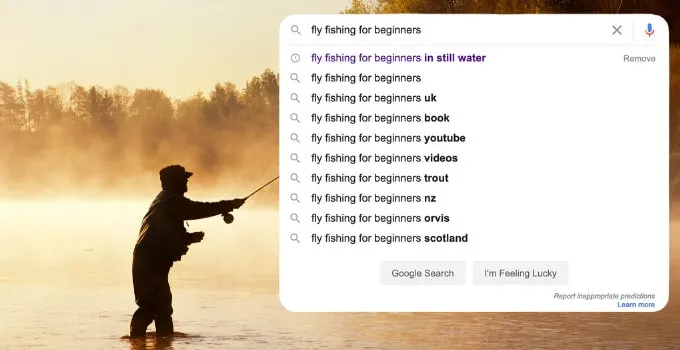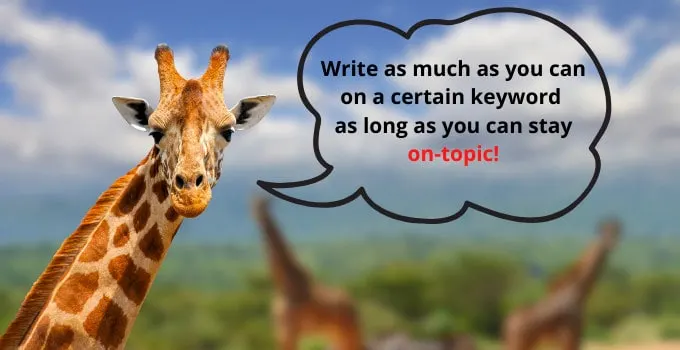If you are expecting me to give you a simple number of words to answer this question, you won’t find that here.
But if you are expecting me to give you the right answer to this question and to answer it in full-depth and in full detail, then you most certainly came to the right place.
Giving you a simple answer as “2000 words” or “1500 words” would just simply be wrong. To be honest, it would be even a lie.
There’s just so much that goes into this question…
…so please grab a coffee, make yourself comfortable and start reading this epically long and brutally honest piece of text.
Understand what people are truly searching for on Google and Co.

This is extremely important. And many bloggers neglect this. There’s no doubt about it.
The fundamental questions when crafting a blog post should always be:
How are your visitors going to find your content?
What exact keywords are they inputting into the search engine to get to your page?
Are they searching with a broad scope or are they getting very granular with their search keywords?
But how do you even know what people are actually looking for on Google?
Well, you simply head over to google.com and you use the so-called alphabet soup method.
Other than that, I suggest you using a nice keyword tool such as Ahrefs. This tool is pricey but it is worth every penny.
Moreover, if you have never used Ahrefs, you can get a 7-day trial. During those 7 days, you will be able to do lots of keyword research for all kinds of topics.
Benefit from those 7 free days and get all the keyword research done for the next couple of months!
Why is this so important? What does this have to do with post length?
Understanding how your visitors actually get to your website (individual blog post) will change the way you are writing your blog posts.
And with that, it will eventually also influence the amount of words you will be putting in your posts.
How so?
Just read on, we will get there!
The post length depends heavily on the topic (keyword)

So, let’s assume you just started your blogging career and are having a blog on fly fishing.
Now, you would like to write an article about the general topic of fly fishing.
How long should that post be?
That kind of post would need to be incredibly long and comprehensive in order to rank.
Why’s that?
Because the scope of this topic is incredibly broad.
In fact, the scope of this article is that broad that I wouldn’t even bother writing this article in the first place…
…except if I would have a very established blog on fly fishing.
If you are still new to the blogging world and just have a couple of blog posts on your fly fishing blog, you will never rank for such a keyword. Trust me.
So, tell me now, how many words should an average blog post have?
The first thing to note here is that the amount of words you should put in a blog article heavily depends on the topic and specifically on how broad the scope of your topic is.
Now, let’s assume that you are writing about a topic in the fly fishing niche that has a more narrow scope: “Fly Fishing for Beginners”.
The scope here is obviously smaller than when just writing about Fly Fishing in general.
However, the scope is still pretty broad so if you are going to tackle this kind of post, you will still need to invest a lot of time and effort in it and in order to rank, you will still want to write a lot of words.
Your blog post about this kind of topic should be around 1500-3000 words. Keyword research is a must here. So you would have to check the top results on Google and verify how many words these results count.
If your competitors wrote about 1500 words about this very topic, write 2000 words. If your competitors (take the Top 3 on Google) wrote 2500 words, write 3000. I guess you got the idea.
Post length (in terms of words written) is obviously just one of many ranking factors. But it is definitely one of the most important ones.
And especially for new blogs and bloggers, writing incredibly in-depth blog posts (provide more details than your competition) is absolutely crucial.
Ok, great. I think I understand the concept of what you are saying. But how am I now going to figure out what kind of topic I should choose in the first place?
This is where things are getting interesting.
I am now going to share with you all of you how I personally tackle new blog posts and how I decide on choosing new topics and how I decide on how many words I am going to write for a specific topic.
Minimal scope, maximum amount of words

As we learned so far, the scope of your article is extremely important.
What I personally found to work best is to choose a very narrow scope but write as much as possible about it.
This is much more difficult than it sounds. It’s kinda like art. And it’s all about experience, really.
Do you remember the example that I mentioned before about writing a text about “Fly Fishing for Beginners?
Would that be a topic with a narrow scope?
Not really, to be honest. The scope of this article is still pretty big and I wouldn’t recommend you tackling a keyword like that if you are still in your first year of blogging (= your blog is still pretty new).
So, taking our example of fly fishing, what would be an example for a topic with a narrow scope?
Longer blog posts are better… most of the time

Long blog posts often don’t get the appreciation they should. A lot of “Gurus” will tell you to write short content but…
To claim that short blog posts rank better is simply wrong. To newbie bloggers, writing very short blog posts that quickly answer a certain question might make sense. Not to Google, though.
There are many studies out there that prove that long content generally performs better than shorter content. Don’t believe me?
Search for 10 keywords of your choice and then check the word count of the top-performing articles compared to the other articles that rank on the first page of Google.
You will definitely find that the top-performing articles usually containt a lot of meat = a lot of words.
Does that mean that short content will always rank worse? No, it doesn’t. It always depends on the niche and especially on the topic itself.
Your aim when writing a blog post should always be that you are giving a COMPLETE answer to a certain question. Some topics or questions can be answered in 500 words, while for other topics a 3000 word answer would be more appropriate.
Now, the art of writing such a blog post consists is to provide the answer to a very specific question without actually providing information that is irrelevant (off-topic). And this, ladies and gentleman, is the true secret of writing a successful blog post. You need to develop a good feeling on how many words are needed for a certain topic.
So how long should the perfect blog post be?
The perfect blog post should contain just as many words necessary to perfectly and completely answer a certain question (the question being the keyword phrase that you are choosing).
As soon as you are starting to give information that is not directly relevant to the question (topic) anymore, this is when your blog post should end.
That said, the art of writing a blog post is also to set the right scope. It doesn’t make sense to set an extremely small scope because in this case, you won’t be able to write enough words about it.
But what are enough words, after all?
The minimum threshold of words that you should drop when writing a blog post is around 1000 (that’s my honest opinion after writing thousands of blog posts).
So when you set the scope for your article, ask yourself the following: Can I answer the question (keyword) in at least 1000 words?
If the answer is no, chances are that the scope you chose is too small. And if it is too small, then make it broader or try to incorporate your topic/idea into another, bigger topic.
Save those monster texts for later on

Another thing you should keep in mind is that the age of your blog matters. It really does.
So, if you just started your bloggin career, let’s say you are 3 months in with your blog, it is generally not advised that you are writing huge blog posts with 3000+ words or more.
Why not?
Ranking on Google takes a long time. And blog authority plays a big factor.
That said, as a new blogger with a new blog, it doesn’t make a whole lot of sense to chase after the biggest keywords in your niche.
Why not?
Because you will simply not rank for these keywords, whatever blog post length your post might have.
So please don’t think that you can outrank your competition on the #1 most important and competitive keyword in the niche just because you are going to write an epic 8000 words post.
This could work but not with a new blog. If you are already a year or two in, this might work. Or would at least be worth a try.
But spare yourself the effort if you just started your blogging journey!
Ideal Post Length: Keyword Research & Competition analysis

One thing you should always do when deciding how long your blog post is going to be is to do keyword research.
Who ranks on top of the search results (Google) for the keyword you are going to write about?
What text type (response post, review, e-commerce landing page) can these top texts be categorized to?
How long are these texts?
How many websites are linking (backlink) to these pages?
These are all important factors that should influence your decision on how long your article is going to be.
Generally speaking, if you are planning to outrank your competition, your text should always be longer than the text of your competition.
But it’s not really just about how long it is, it is much more about how accurate the text is, how comprehensive the text is and how well your text is actually answering a specific question.
As a general rule of thumb: If you do check the top positions on Google for a certain keyword and you find amazing texts there that treat a subject in all-depth and give all the answers you’ll ever need about that certain topic, you probably want to skip it and tackle another keyword.
However, if you do feel that the answer that is given there is not complete, the text is too short and not even written well, this is a good indication that you might be able to outrank that website by (simply) writing the best resource ever on that topic.
And the best resource ever usually means that your text should be:
much longer,
much more comprehensive,
formatted more nicely (add some graphics, pictures, infographics, videos, etc..)
and should give the visitor everything he ever wants to know about the question (keyword) that he was looking for.
The Ideal Blog Post Length if you are monetizing your post with display ads

If we are talking the ideal blog post length (in terms of word length) when display ads (from ad platforms such as Ezoic or Mediavine) are a factor, then the answer would also be:
The longer, the better. Because more words usually also mean that that the vertical length of your blog post will be increased, which is always good for ad revenue.
Why?
Because if your blog post is longer, you will be able to fit more ads into the content.
And while we are at it, let me just give you another extremely useful hack right here and now: Don’t just write a lot of words, make lots of line breaks.
Typically, you would want to make a line break after like 2 sentences.
Why?
You have probably guessed it by now: It increases the vertical length (height) of the text = more ads fit into the content = more money.
Moreover, adding lots of white spaces between your content will actually also improve the user experience, as it is easier to read like that.
So, please. Don’t write your blog posts as you would write a book. There’s nothing worse than super long paragraphs. It simply doesn’t work for blog posts and there is just really no benefit in doing it that way.
More Words Yes, Off-Topic Words No

I have mentioned this all along the way but it really can’t be stressed enough: You have got to choose your words nicely when writing a blog post about a certain topic.
Ideally, every word, sentence, & paragraph should be in direct relation with the original topic.
You absolutely have to make sure that you don’t stray off the subject.
Because when you stray off the subject, this won’t help you to rank for your focus keyword.
On the contrary, this will drastically hurt the quality of your text and it will drastically decrease your chances of ranking for your focus keyword.
Sounds logical?
Well, yea. But still, most writers & bloggers have huge problems to put this is into practice.
If you want to rank better, you have to keep this in mind. Don’t beat around the bush, provide content that is on point and deals with one main question at the time!
So, how many words do I need to pack into that blog post now?

In this article, we have seen that the question of “How many words does an average blog post need to have ?” is an incredibly complex question.
Rather than providing you with a standard answer such as “write at least 2000 words”, “for a pillar post you need at least 4000 words”, “make your review post at least 3500 words”, I was trying to provide you with the background info that truly matters when writing a blog post.
You should now have a better idea on how many words will be necessary to write the perfect blog post.
Just remember, the answer to this question is never set into stone and has to be reevaluated for each and every topic.
Still, one thing I would like to point out before it’s all said and done is that very short texts generally don’t rank well at all. There are of course exceptions to this rule.
Sometimes when doing keyword research, you will find top results, even the #1 result, having a ridiculously low amount of words. I have seen blog posts with 300 words ranking on top of the SERPs. And I have seen this hundreds if not thousands of times.
But the reality here is that, most of the time, these posts don’t rank on top because their content is good, they rank on top because these domains are usually domains with extremely high authority.
What’s more, these super short kinds of texts that rank so well usually also have a TON of backlinks to them. And sometimes, as sad as it is, just having a lot of backlinks will be enough to rank high in the SERPs even if the blog post itself is absolute trash.
Wait….now I am really confused…How many words should I write in my blog posts then?
Try to set the scope of your article at least as broad so that you can reach at least around 1000 words. To be honest, I rarely even produce content that is less than 1500 words long.
The times you could produce blog posts with just 300 words and get loads of traffic on your website are long gone, trust me on that.
Especially if you are working a new website. If you have an incredibly popular website, then you could possibly rank with 300 words but if you don’t, chances to rank a 300 word blog post are very slim…unless you have tons of backlinks linking to that 300-word article.
And guess what…this will usually not happen because a 300-word blog post is not likely to attract a lot of backlinks in the first place because in most cases, it just simply won’t answer a certain question very well.

Hey guys! It’s me, Marcel, aka Maschi. On MaschiTuts, it’s all about tutorials! No matter the topic of the article, the goal always remains the same: Providing you guys with the most in-depth and helpful tutorials!


